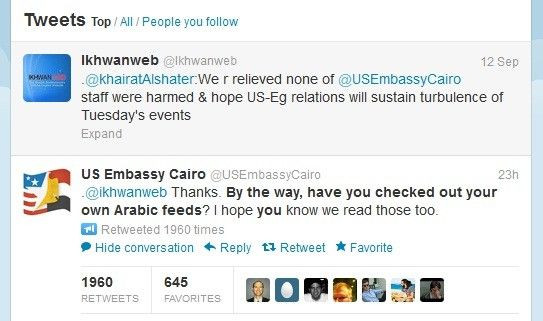Muslim Brotherhood, U.S. State Dept. In Tit-For-Tat Tweet Row

The U.S. Embassy in Cairo got snarky on the Muslim Brotherhood after the Egyptian political party tweeted a message expressing relief that no embassy staff in Cairo had been harmed. The same Twitter message stated that the Brotherhood hoped that relations between the two countries would remain stable despite the protests that have erupted over the inflammatory film "Innocence of Muslims," which was made in the United States.
To which the Embassy replied on Thursday: "Thanks. By the way, have you checked out your own Arabic feeds? I hope you know we read those too."
Through its @Ikhwanweb Twitter feed, Muslim Brotherhood replied: "we understand you're under a lot of stress, but it will be more helpful if you point out exactly the Arabic feed of concern."
The embassy had yet to reply Friday morning, but the implication is that the party of Egyptian President Mohammed Morsi is couching its condolences in English but fanning the fire of outrage over the deeply blasphemous film in Arabic.
However, without clarification, the world is left to pore over Ikhwanweb's Arabic-language Tweets and other communications to figure out what the embassy means. Some Arab language media outlets have been known in the past to use fiery rhetoric when communicating to Arab-speaking audiences -- especially when criticizing Israel, Western powers and minority Islamic offshoots such as Shia Ismailis.
However, the Associated Press reviewed recent Muslim Brotherhood Tweets in Arabic to find it had denounced both the film and the breaching of embassy grounds while insisting Egyptians have the right to peacefully demonstrate.
The Muslim Brotherhood had initially called for a nationwide protest against the film, which not only violates an Islamic sanction against depicting the Prophet Muhammad, but which also depicts him as a brutal misogynist and child rapist. However, after thousands gathered on their own around the U.S. Embassy, the party announced it had cancelled the call.
Regardless, it appears Muslims across the Middle East have taken to the streets following juma al salat (the midday Friday prayer and sermon) to express their outrage over what is widely perceived to be a general anti-Islamic sentiment coming from the West.
Protests and boycotts occur regularly in the Muslim world after incidents occur that are perceived to represent a general trend of Western anti-Islamic sentiment, such as when France banned the wearing of hijabs or when insulting cartoons were published in Denmark. Many Muslim's perceive there to be an alleged the double standard in some European countries that allow Islamic blasphemy but ban Holocaust denial.
© Copyright IBTimes 2025. All rights reserved.





















